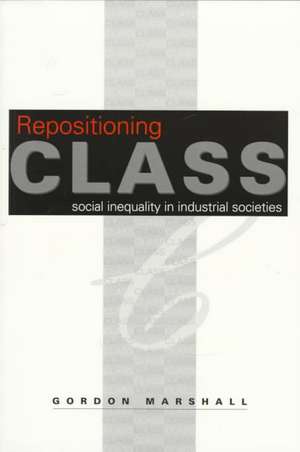Repositioning Class: Social Inequality in Industrial Societies
Autor Gordon Marshallen Limba Engleză Paperback – 10 iul 1997
Preț: 423.79 lei
Preț vechi: 498.58 lei
-15% Nou
Puncte Express: 636
Preț estimativ în valută:
81.10€ • 84.36$ • 66.95£
81.10€ • 84.36$ • 66.95£
Carte tipărită la comandă
Livrare economică 14-28 aprilie
Preluare comenzi: 021 569.72.76
Specificații
ISBN-13: 9780761955580
ISBN-10: 0761955585
Pagini: 256
Dimensiuni: 156 x 234 mm
Greutate: 0.36 kg
Ediția:1
Editura: SAGE Publications
Colecția Sage Publications Ltd
Locul publicării:London, United Kingdom
ISBN-10: 0761955585
Pagini: 256
Dimensiuni: 156 x 234 mm
Greutate: 0.36 kg
Ediția:1
Editura: SAGE Publications
Colecția Sage Publications Ltd
Locul publicării:London, United Kingdom
Recenzii
`The volume provides an exceptionally useful presentation of the contributions of the Nuffield approach to macro-sociological research and Gordon Marshall's particular contributions. The essays are very well written, the methodology superb, and the arguments cogent and well justified in theory and evidence. They cover a wide range of topics. Specific issues include a treatment of the debate about the unit of class analysis, an issue that has important implications for the treatment of gender in class analysis. It covers cross-national similarities in mobility regimes, comparing Britain to the United States, Scandinavia, and the former communist countries of Eastern Europe, including the Soviet Union. There are analyses of the impact of class on voting and on the development of the particular attitudes that have been identified with the underclass. Finally, Marshall provides a lucid discussion of meritocracy and social justice' - The Annals of the American Academy of Political and Social Science
`Marshall is to be congratulated on a sustained case for the retention of social class (however defined) as an independent analytic variable which is central to the understanding of contemporary industrial capitalist societies' - British Journal of Sociology
`It captures homogenous categories according to living conditions....Marshall's essays provide abundant evidence for the scheme's empirical usefulness and the important insights into the social structures of industrialized societies' - The American Academy of Political and Social Science
`Marshall is to be congratulated on a sustained case for the retention of social class (however defined) as an independent analytic variable which is central to the understanding of contemporary industrial capitalist societies' - British Journal of Sociology
`It captures homogenous categories according to living conditions....Marshall's essays provide abundant evidence for the scheme's empirical usefulness and the important insights into the social structures of industrialized societies' - The American Academy of Political and Social Science
Cuprins
Introduction
Class and Class Analysis in the 1990s
PART ONE: SOCIAL THEORY
Distributional Struggle and Moral Order in a Market Society
The Promising Future of Class Analysis
A Response to Recent Critiques
PART TWO: METHOD AND MEASUREMENT
Classes in Britain
Marxist and Official
Social Class and Underclass in Britain and the USA
Class, Gender and the Asymmetry Hypothesis
PART THREE: SOCIAL MOBILITY
Proletarianization in the British Class Structure?
Intergenerational Social Mobility in Communist Russia
Intergenerational Class Processes and the Asymmetry Hypothesis
PART FOUR: SOCIAL JUSTICE
Social Class and Social Justice
Was Communism Good for Social Justice? A Comparative Analysis of the Two Germanies
Class and Class Analysis in the 1990s
PART ONE: SOCIAL THEORY
Distributional Struggle and Moral Order in a Market Society
The Promising Future of Class Analysis
A Response to Recent Critiques
PART TWO: METHOD AND MEASUREMENT
Classes in Britain
Marxist and Official
Social Class and Underclass in Britain and the USA
Class, Gender and the Asymmetry Hypothesis
PART THREE: SOCIAL MOBILITY
Proletarianization in the British Class Structure?
Intergenerational Social Mobility in Communist Russia
Intergenerational Class Processes and the Asymmetry Hypothesis
PART FOUR: SOCIAL JUSTICE
Social Class and Social Justice
Was Communism Good for Social Justice? A Comparative Analysis of the Two Germanies
Descriere
In recent years the death of social class has been regularly reported - such pronouncements have been as exaggerated as they were untimely. Social class is as important to the understanding of late twentieth-century industrial societies as it was to their early twentieth-century counterparts. This book aims to explain why class has persisted as such a potent social force.
In Repositioning Class Gordon Marshall uses the comparative study of British experiences in relation to those of the United States, Scandinavia and the former communist countries of Eastern Europe. Also examined are cases where Britain provides the exclusive focus for discussion either about class itself, or about how sociologists might most useful









